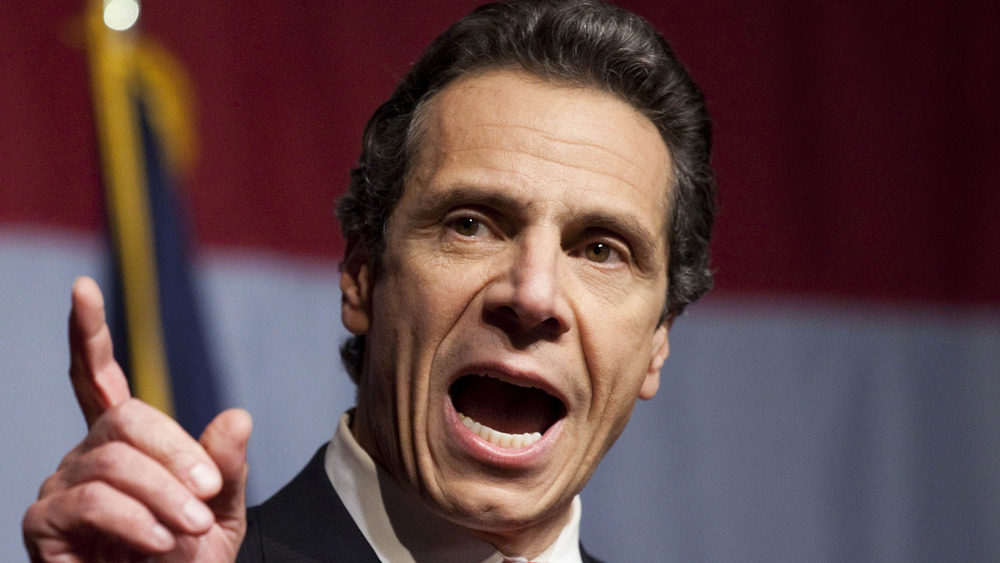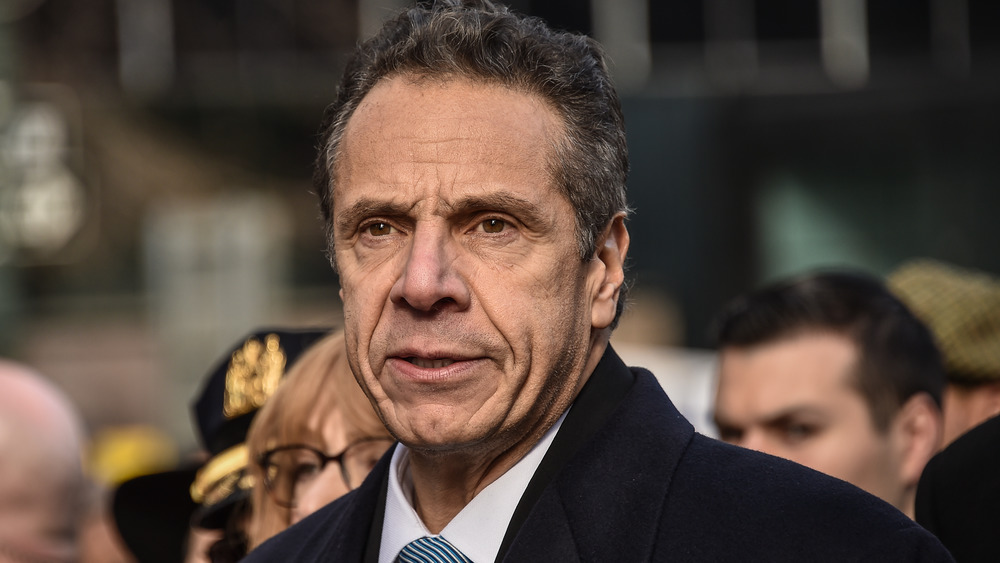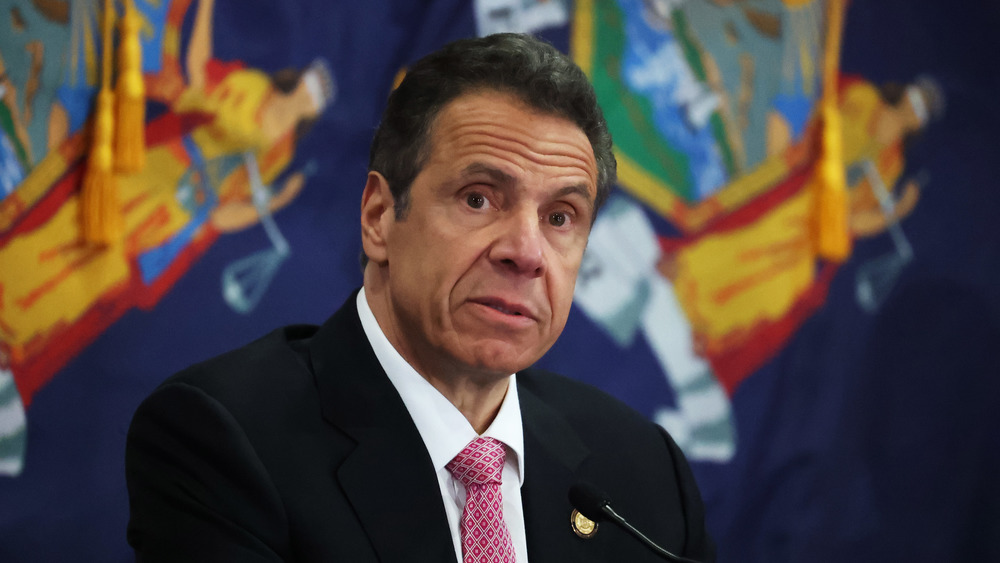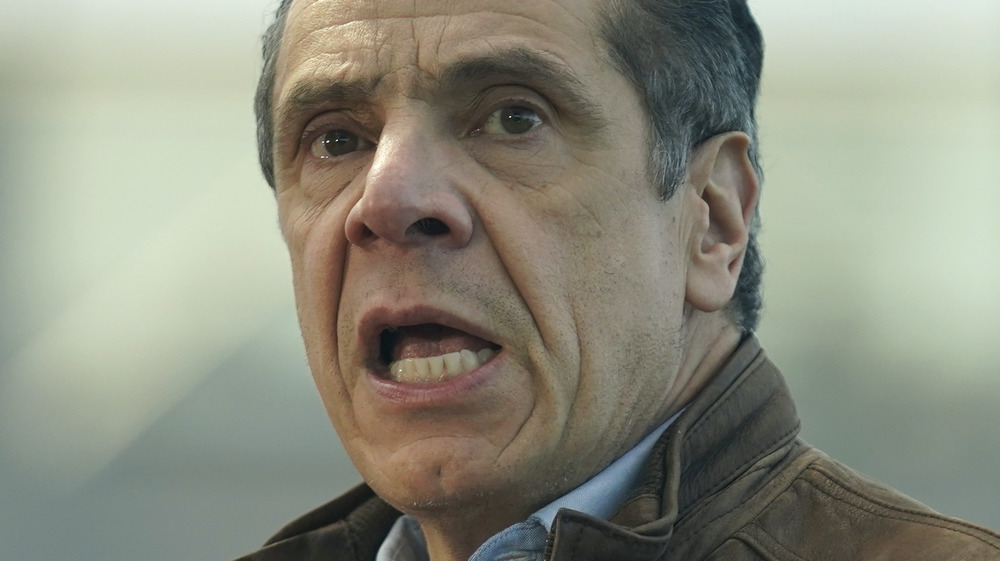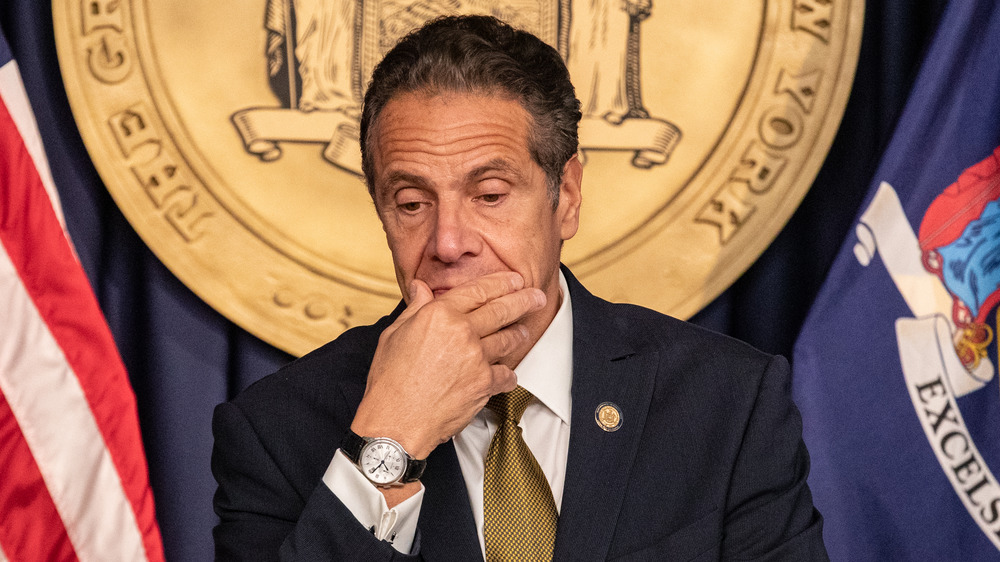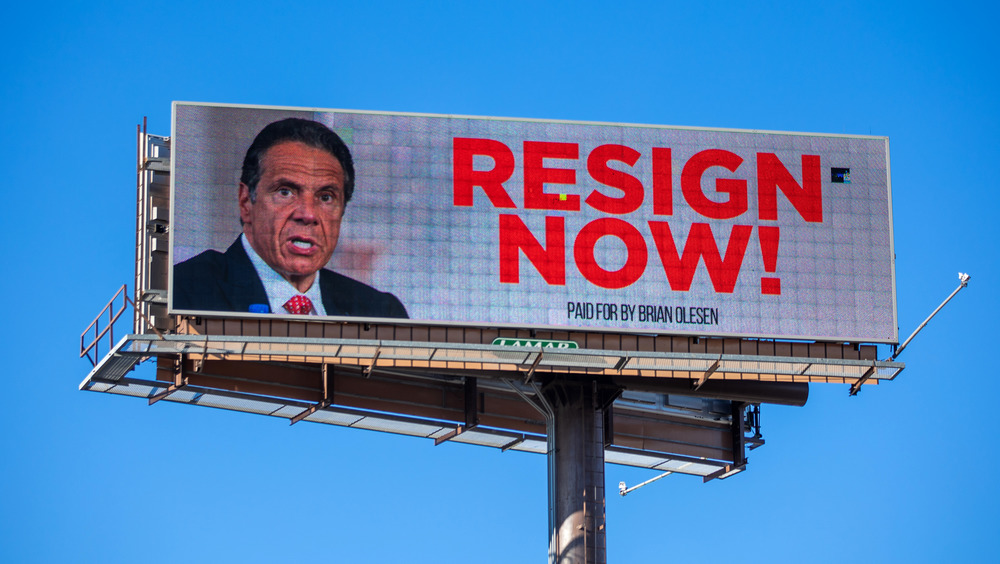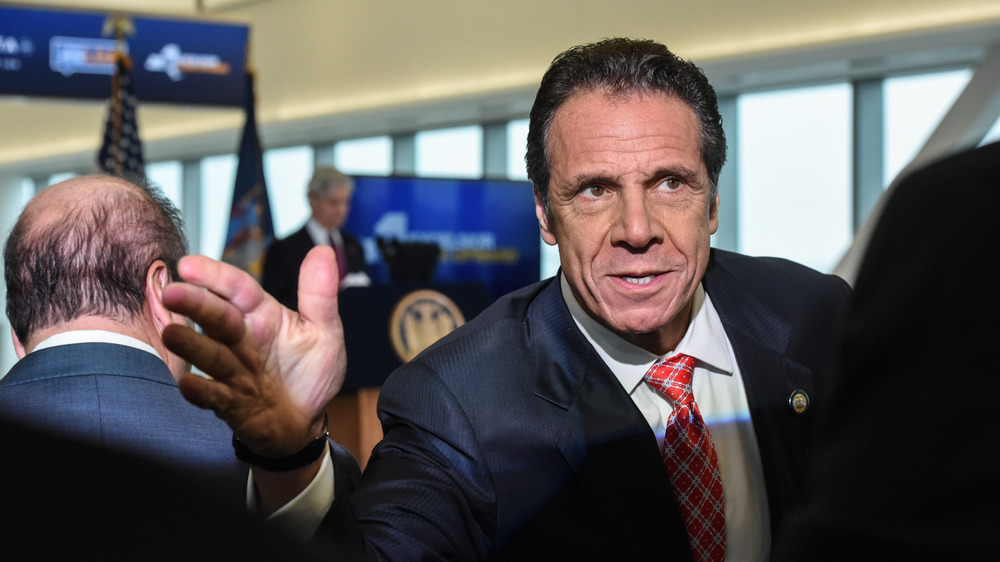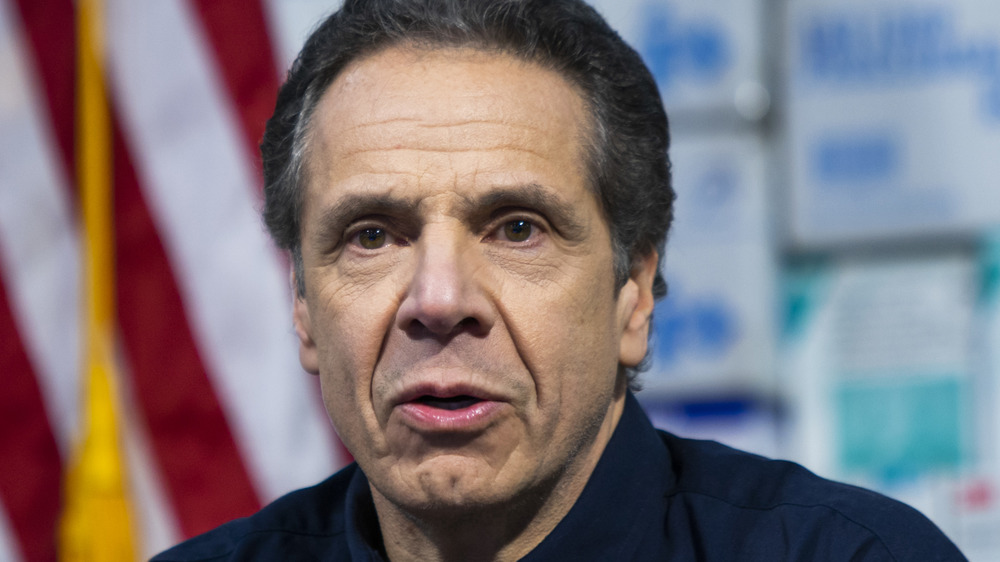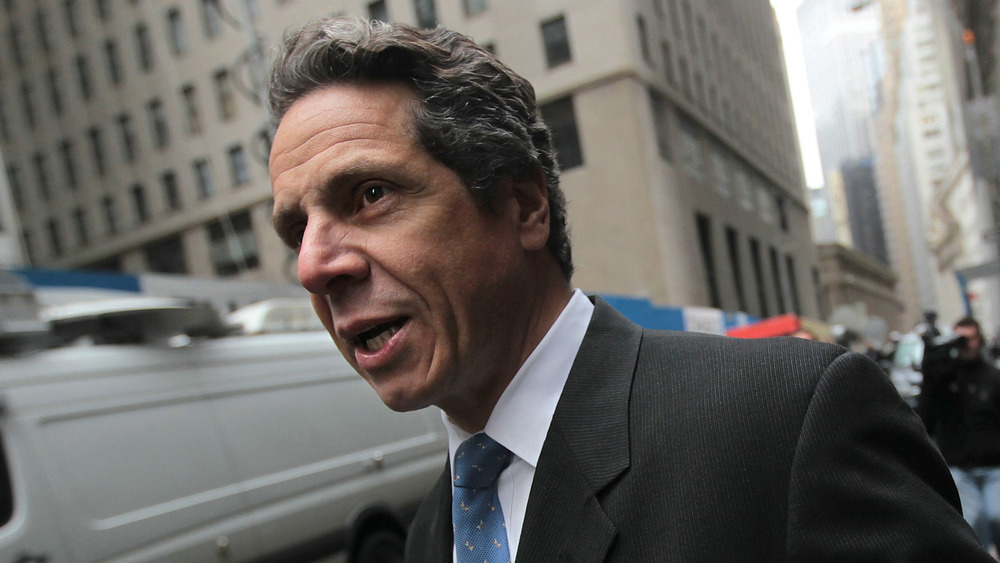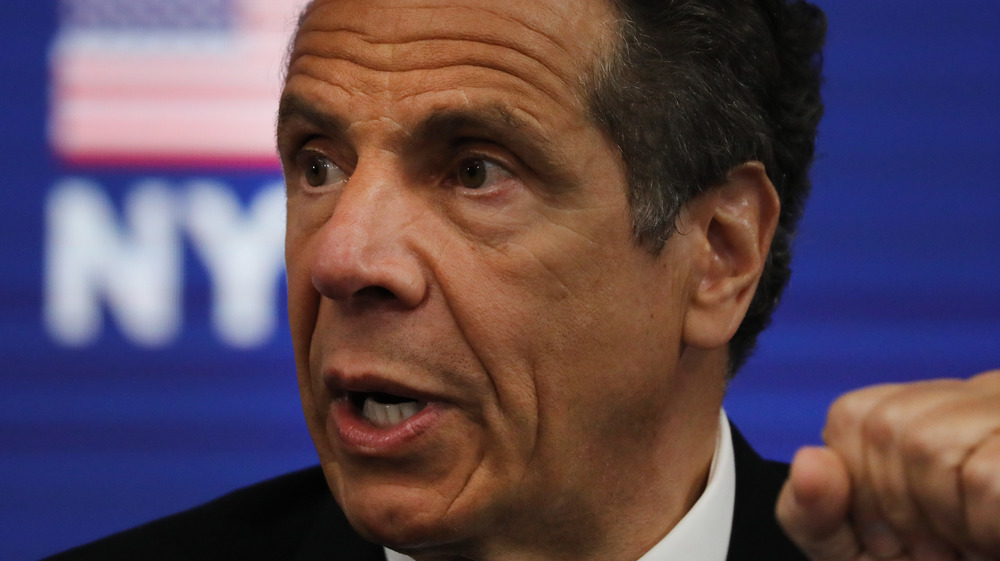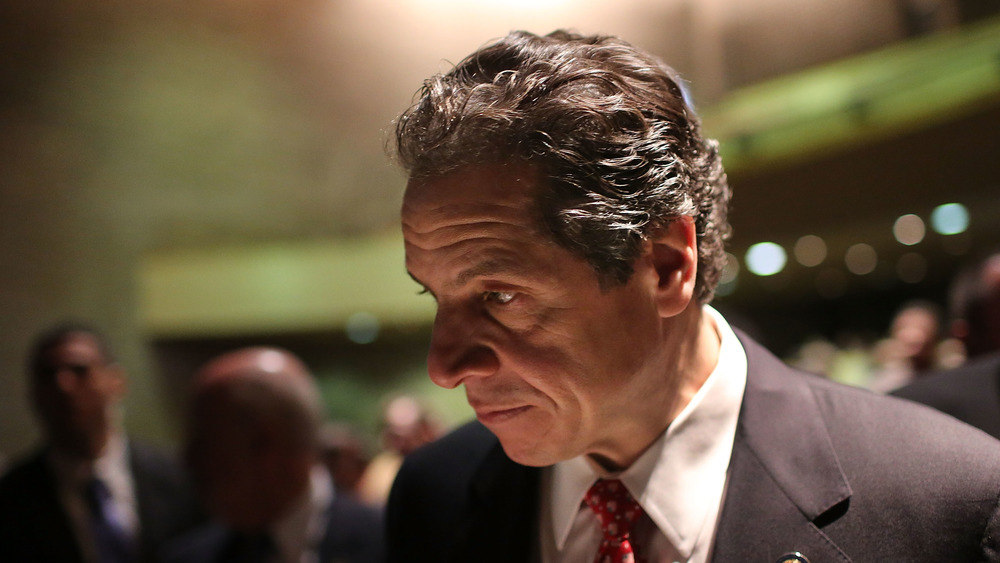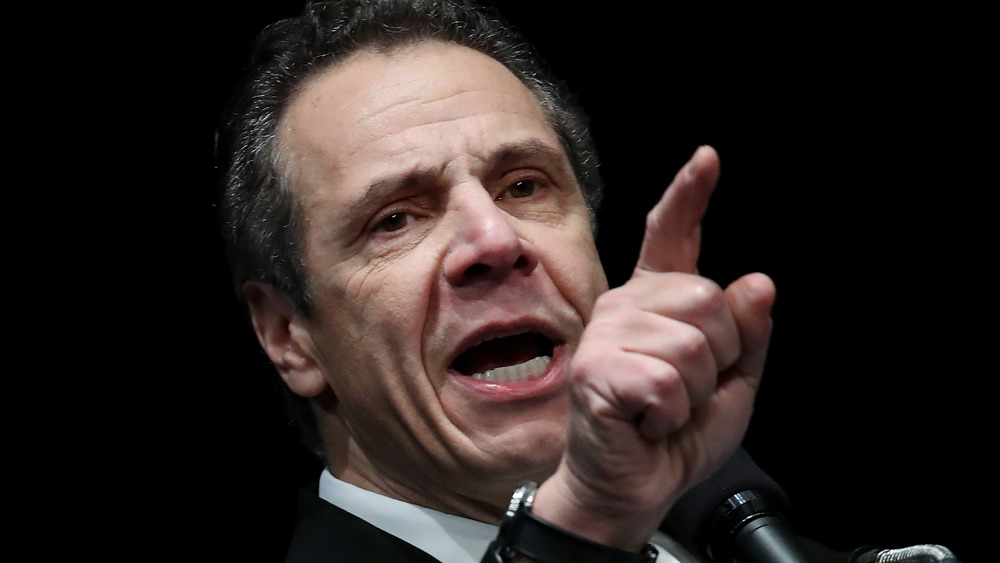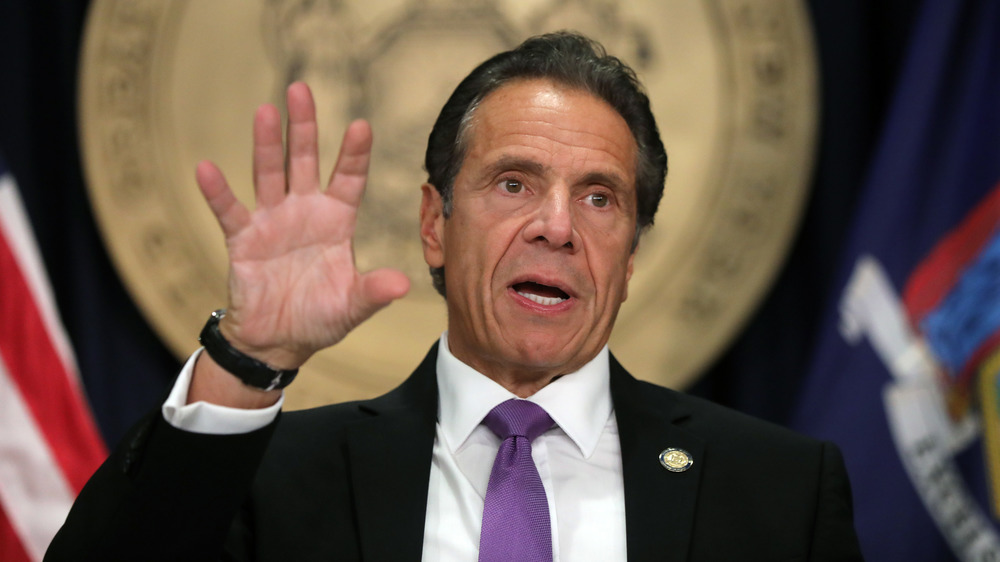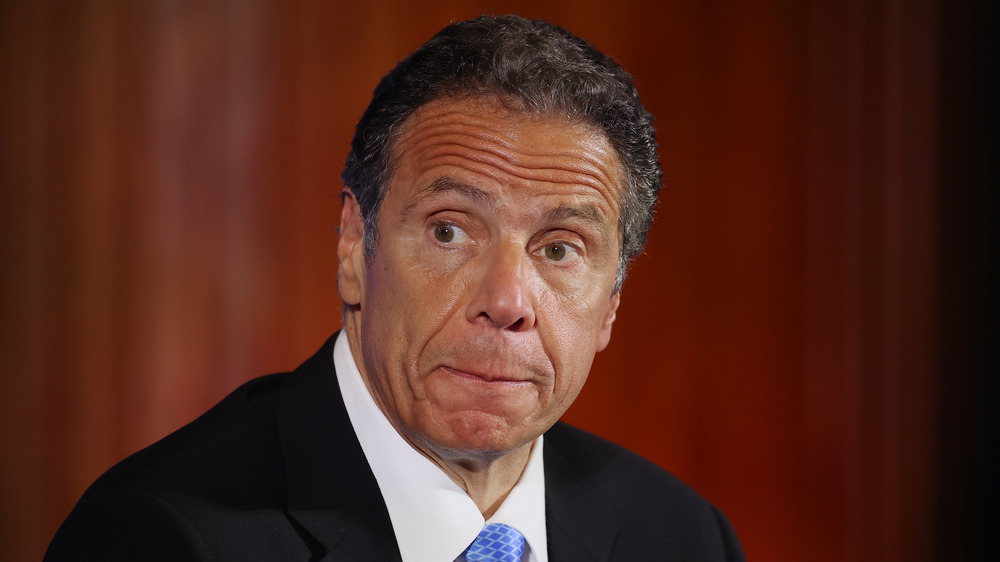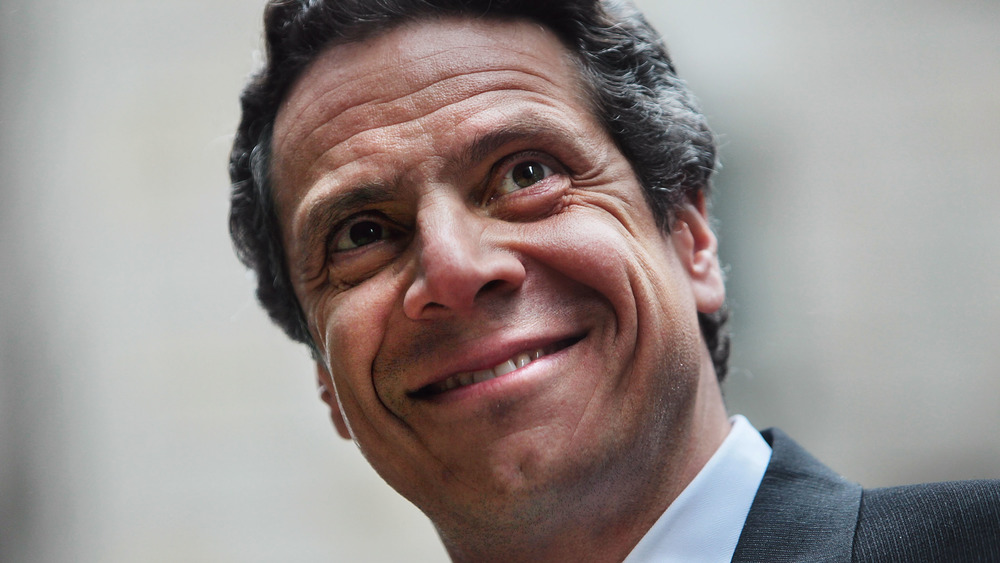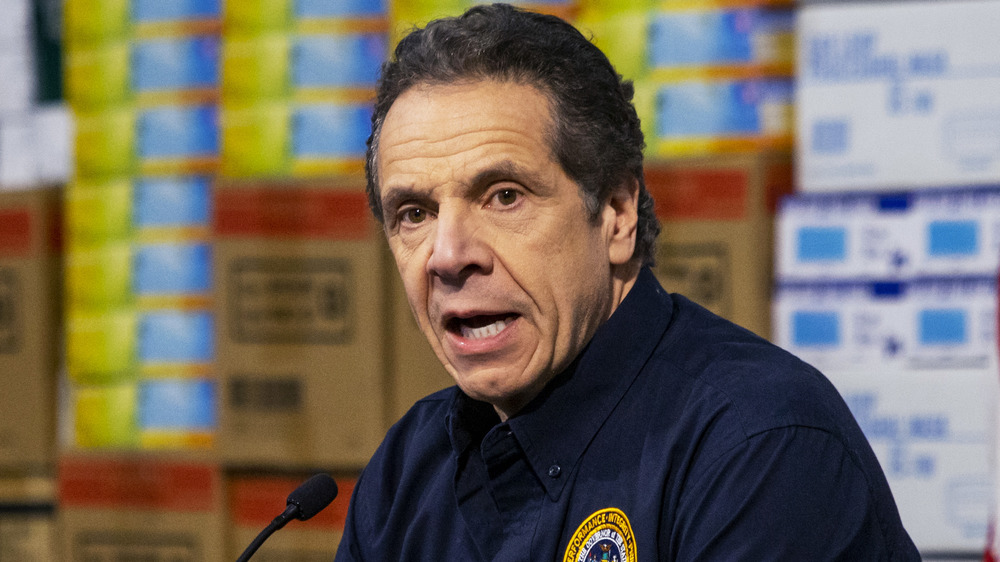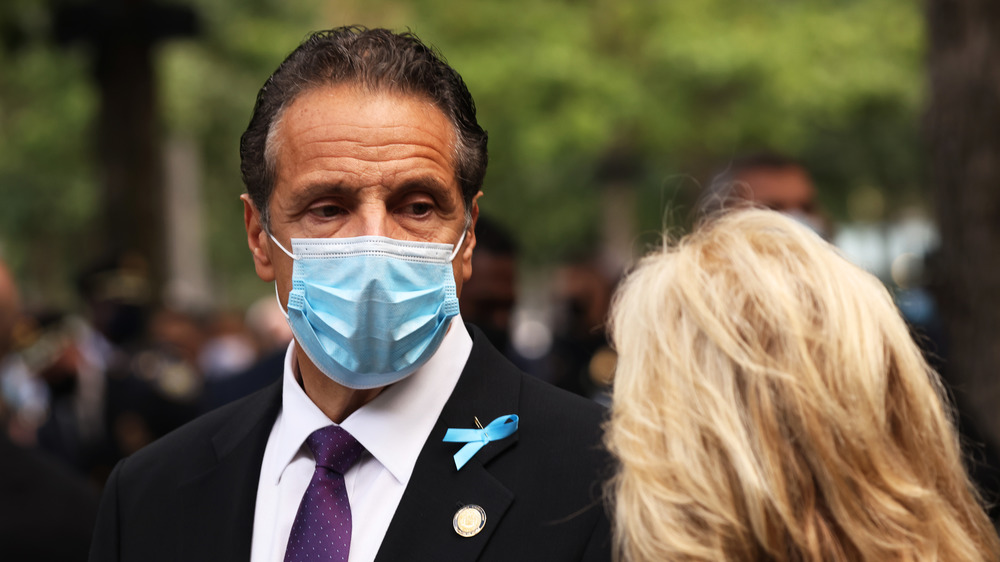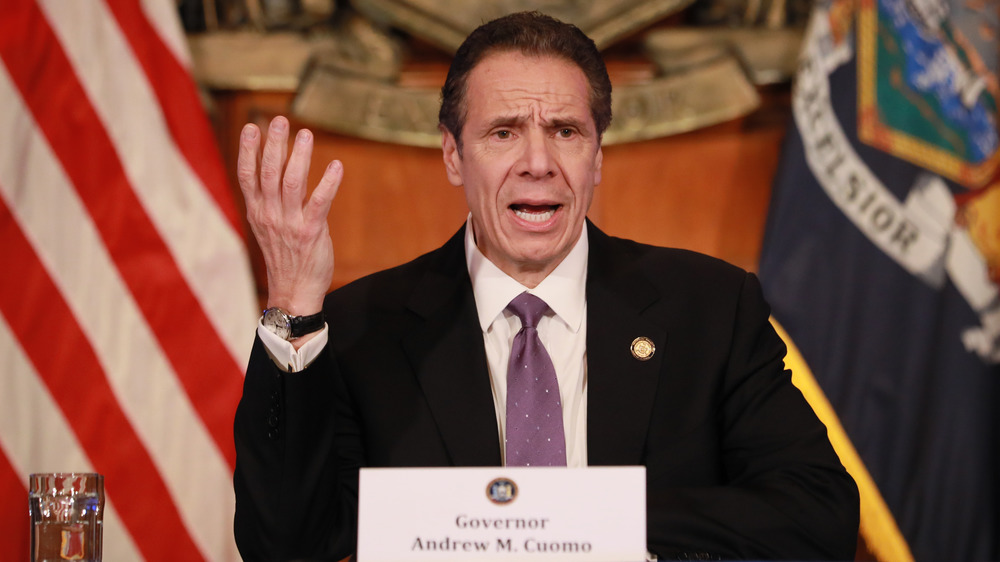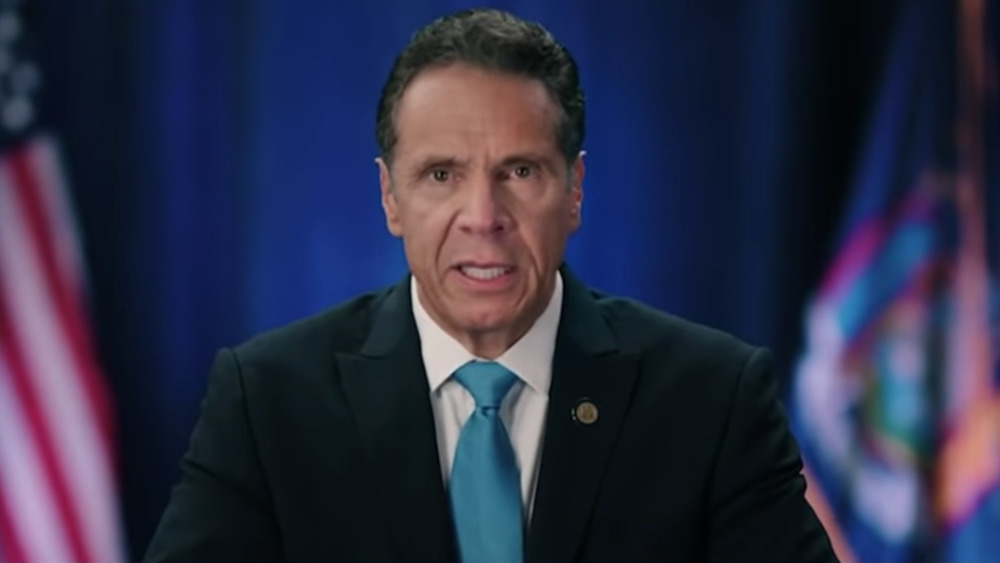The Shady Side Of Andrew Cuomo
The following article includes allegations of sexual harassment.
New York Governor Andrew Cuomo took office in 2011, but the brash Queens native became a household name in 2020 during his daily press conferences at the early stages of the COVID-19 pandemic. His displays of calm and steady leadership were in stark contrast to then-President Donald Trump's, and a new political media star was born. His press conference became must-see television for political junkies, and the fawning public reached critical cringe mass when the term "Cuomosexual" was born. Cuomo's publicized combative relationship with Trump made him more of a media darling among liberals who saw him as the tough counterpuncher the party needed against the sitting president who routinely threw proverbial haymakers at his perceived enemies.
"He better have an army if he thinks he's gonna walk down the street in New York. New Yorkers don't want to have anything to do with him," Cuomo said (via the New York Post). And after Trump criticized Cuomo's younger brother, CNN's Chris Cuomo, the Empire State's governor went full gloves off. "If I wasn't governor of New York, I would have decked him. Period," Cuomo said of Trump on an episode of The Howard Stern Show (via New York Daily News). "I mean he was attacking me, he was attacking my family, he was anti-Italian. Every nasty thing."
However, much like with most politicians, things aren't always what they appear. Let's take a deep dive into the shady side of Andrew Cuomo.
Andrew Cuomo was accused of sexual harassment
On Dec. 13, 2020, former Cuomo administration aide Lindsey Boylan accused Andrew Cuomo of workplace sexual harassment. "Yes, @NYGovCuomo sexually harassed me for years. Many saw it, and watched," she wrote on Twitter. "I could never anticipate what to expect: would I be grilled on my work (which was very good) or harassed about my looks. Or would it be both in the same conversation? This was the way for years."
In the same Twitter thread, Boylan alleged "no one would do a d**n thing" when they saw the harassment happening and suggested that she wasn't the only woman in Cuomo's office to suffer abuse. In another thread, Boylan called working for Cuomo "beyond toxic" and "endlessly dispiriting" if you weren't part of his inner circle. As the AP reported, Cuomo denied the allegations two days later at a press conference, telling reporters, "I fought for and I believe a woman has the right to come forward and express her opinion and express issues and concerns that she has, but it's just not true."
According to The New York Times, Cuomo had a testy exchange in 2017 with reporter Karen DeWitt who asked him about the sexual harassment allegations against his former senior aide, Sam Hoyt, and how he could stop this from happening in state government. "You do a disservice to women, with all due respect, even though you're a woman," he said. "It's not government, it's society." Yikes.
If you, or anyone you know, have been a victim of sexual harassment or sexual assault, help is available. Visit the Rape, Abuse & Incest National Network (RAINN) website or contact RAINN's National Helpline at 1-800-656-HOPE (4673).
Andrew Cuomo faced a second allegation of sexual harassment
Charlotte Bennett — a former executive assistant and health policy adviser in the Cuomo administration, who resigned in November 2020 — became the second woman to come forward with allegations of sexual harassment against Andrew Cuomo on Feb. 27, 2021 (via The New York Times). According to Bennett, the alleged incident took place while the two were alone together in the State Capitol office during the summer of 2020.
The then-25-year-old adviser claimed that Cuomo had asked what she thought of age differences in relationships and when she last hugged someone during the pandemic. When Bennett replied her parents, Cuomo allegedly responded with, "No, I mean like really hugged somebody?" Bennett told the outlet, "I understood that the governor wanted to sleep with me, and felt horribly uncomfortable and scared, and was wondering how I was going to get out of it and assumed it was the end of my job."
Cuomo initially denied the allegations, but the next day, he issued a statement claiming he was just joking. "At work sometimes I think I am being playful and make jokes that I think are funny," he said (via NBC News). "I mean no offense and only attempt to add some levity and banter to what is a very serious business." He added that his interactions with women "may have been insensitive or too personal and that some of my comments, given my position, made others feel in ways I never intended."
If you, or anyone you know, have been a victim of sexual harassment or sexual assault, help is available. Visit the Rape, Abuse & Incest National Network (RAINN) website or contact RAINN's National Helpline at 1-800-656-HOPE (4673).
A third harassment claim opened the floodgates
After Andrew Cuomo was hit with this second sexual harassment allegation, high-ranking Democrats — such as Senators Chuck Schumer and Kirsten Gillibrand and Representative Alexandria Ocasio-Cortez — called for an independent investigation into the claims (via The New York Times). Meanwhile, President Joe Biden's press secretary, Jen Psaki, called the allegations "serious," and added that "it was hard to read that story, as a woman."
But less than a week later, a third woman came forward with sexual harassment allegations of her own. Then-33-year-old Anna Ruch claimed that she hadn't met the embattled governor prior the fall of 2019. Cuomo reportedly said that she appeared "aggressive" after she removed his hand from her lower back at wedding reception they both attended, before putting his hands on Ruch's face and asking to kiss her, per The New York Times, which shared a photo of the incident. "I was so confused and shocked and embarrassed," Ruch said. "I turned my head away and didn't have words in that moment."
Cuomo issued a statement claiming that his behavior "[had] been misinterpreted as an unwanted flirtation," but added, "To the extent anyone felt that way, I am truly sorry about that." After this allegation, New York Attorney General Letitia James announced an investigation in the sexual misconduct claims against the embattled governor. "We are committed to an independent and thorough investigation of the facts," James said. Little did Cuomo know, the floodgates were about to swing wide open.
If you, or anyone you know, have been a victim of sexual harassment or sexual assault, help is available. Visit the Rape, Abuse & Incest National Network (RAINN) website or contact RAINN's National Helpline at 1-800-656-HOPE (4673).
A fourth woman comes forward to accuse Andrew Cuomo of sexual misconduct
On March 6, 2021, Ana Liss, a former policy and operations aide to Andrew Cuomo, told The Wall Street Journal that that the governor engaged in multiple unsolicited acts of verbal and physical sexual misconduct and viewed her as "just a skirt." The outlet reported that Liss, who worked for Cuomo from 2013 to 2015, said she first felt it was just "harmless flirtation," but then realized it was not. "It's not appropriate, really, in any setting," she said.
Liss, who was felt the need to come forward after the first three women told their stories, stated that Cuomo routinely talked about her appearance and recalled an incident at the Executive Mansion where "he came right over to [her] and he was like, 'Hey, Sweetheart!'" then hugged her, kissed her twice, and grabbed her waist all to just pose for a picture. Liss said that she didn't file a former complaint, but requested a transfer. She also admitted that her experience in government made her seek out mental health counseling and caused her to self-medicate with alcohol.
Rich Azzopardi, a senior adviser to Cuomo, responded to Liss' allegations, saying: "Reporters and photographers have covered the governor for 14 years watching him kiss men and women and posing for pictures. At the public open-house mansion reception, there are hundreds of people, and he poses for hundreds of pictures. That's what people in politics do."
If you, or anyone you know, have been a victim of sexual harassment or sexual assault, help is available. Visit the Rape, Abuse & Incest National Network (RAINN) website or contact RAINN's National Helpline at 1-800-656-HOPE (4673).
The calls for Andrew Cuomo's resignation grew louder with an authorized impeachment hearing
On March 11, 2021, more than half of New York state legislators signed a letter calling for the resignation of Andrew Cuomo, citing his handling of COVID-19 related nursing home deaths and numerous sexual misconduct allegations (via WIVB in New York). The letter states that Cuomo "has lost the confidence of the public and the state legislature, rendering him ineffective in this time of most urgent need," and that Lt. Governor Kathy Hochul "can step in and lead for the remainder of the term, and this is what is best for New Yorkers in this critical time." The statement added, "It is time for Governor Cuomo to resign."
New York Assembly Speaker Carl Heastie responded to the letter, "In light of the allegations concerning the Governor over the last several weeks, I will be meeting with members in conference today on potential paths forward." Heastie eventually authorized an impeachment investigation and stated (via 7 ABC WKBW Buffalo) that Cuomo should "seriously consider" if he's able to lead the state while facing an avalanche of accusations and investigations.
However, Cuomo has no plans of stepping down. "I was elected by the people of the state, not by politicians," Cuomo told reporters (via CBS News). "I'm not going to resign because of allegations. The premise of resigning because of allegations is actually anti-democratic." Adding there was "no way" he'd resign.
Andrew Cuomo's sixth allegation was reported to the police
On March 9, 2021, a sixth woman came forward to allege that Andrew Cuomo groped her while she was visiting his Executive Mansion. The woman, who was a Cuomo aide at the time, stated that she was invited to Cuomo's residence to fix a technical issue with his mobile phone. However, once she arrived, things took a horrific turn. "They were alone in Cuomo's private residence on the second floor of the mansion when he closed the door and allegedly reached under her blouse and began to fondle her," The Albany Times Union reported (via WLNY 10 CBS New York).
In a statement, Cuomo denied the allegations. "I have never done anything like this. The details of this report are gut-wrenching. I am not going to speak to the specifics of this or any other allegation given the ongoing review, but I am confident in the result of the Attorney General's report," he said.
But two days later, The New York Times reported that the Albany police stated that they received a complaint about the incident between Cuomo and the aide that may meet "to the level of a crime." The governor's acting counsel, Beth Garvey, said she was the one who called to report the incident, per state policy. "The person is represented by counsel and when counsel confirmed the client did not want to make a report, the state notified the police department and gave them the attorney's information," Garvey said.
If you, or anyone you know, have been a victim of sexual harassment or sexual assault, help is available. Visit the Rape, Abuse & Incest National Network (RAINN) website or contact RAINN's National Helpline at 1-800-656-HOPE (4673).
Did Andrew Cuomo attempt to discredit Lindsey Boylan?
According to a report in The Wall Street Journal, Andrew Cuomo's current aides allegedly contacted former aides to discredit his first accuser, Lindsey Boylan. The calls were reportedly ordered by Cuomo's top aide, Melissa DeRosa. One of the former aides to receive the call? Cuomo's fourth accuser, Ana Liss. "I felt intimidated, and I felt bewildered," she said of the call. Liss stated that Cuomo's senior adviser Rich Azzopardi called her eight days after Boylan first accused Cuomo of sexual misconduct on Twitter in December 2020, although Liss had not worked for Cuomo since 2018.
Azzopardi claims that DeRosa didn't organize any effort to mass call former aides. "There was no directed effort — this outreach happened organically when everyone's phone started to blow up," he said. He added that the calls were more of a "heads up" to former aides who might be questioned by lawyers or the media.
"After Ms. Boylan's tweets in December, she, and her lawyers and members of the press began reaching out to former members of the Chamber, many of whom never worked with her," Azzopardi said in a statement (via WSJ), adding, "Those former members of the Chamber called to let various staff people know and convey that they were upset by the outreach. As a result, we proactively reached out to some former colleagues to check in and make sure they had a heads up."
Andrew Cuomo was hit with a fifth allegation
On March 6, 2021, Karen Hinton, a former press aide for Andrew Cuomo, claimed that he pulled her a little too close in his hotel room after a work event in 2000. Speaking with The Washington Post, Hinton said Cuomo allegedly invited her to his hotel room under the guise of talking out their differences since she had resigned her position at the Cuomo-led U.S. Department of Housing and Urban Development (HUD) after the pair had a falling out.
Hinton then stated that Cuomo specifically asked her to avoid his security guard, and when she arrived the room was dimly lit. Cuomo allegedly embraced her as she stood up to leave and she pulled away because it was "very long, too long, too tight, too intimate ... not just a hug," she said, adding, "He pulls me back for another intimate embrace. I thought at that moment it could lead to a kiss, it could lead to other things, so I just pull away again, and I leave."
Peter Ajemian, Cuomo's director of communications, denied the account and called Hinton "a known antagonist" of Cuomo's looking "to score cheap points with made up allegations from 21 years ago." Hinton replied, saying, "Attacking the accuser is the classic playbook of powerful men trying to protect themselves." She added, "I really thought the flirt wasn't about having sex. It was about controlling the relationship."
If you, or anyone you know, have been a victim of sexual harassment or sexual assault, help is available. Visit the Rape, Abuse & Incest National Network (RAINN) website or contact RAINN's National Helpline at 1-800-656-HOPE (4673).
The impact of Andrew Cuomo's nursing home order
When the novel coronavirus was first raging through New York in the spring of 2020, Andrew Cuomo was harshly criticized over requiring nursing homes to accept patients even if they were COVID-19 positive. The policy created massive outbreaks and deaths to the most vulnerable of the state's population. As the AP reported, an estimated 4,500 infected patients were sent to nursing homes across the state. According to ProPublica, the virus ended up "killing more than 6,000 people" in nursing homes throughout New York in the weeks after the order went into effect.
In a report by The Guardian, Cuomo signed a bill that "gave immunity to nursing home executives" after the Greater New York Hospital Association infused Cuomo's campaign with over $2.3 million in donations. Democratic assemblyman Ron Kim told the outlet that the bill "was drafted, submitted, and negotiated into law by Governor Andrew Cuomo and his staff" for the specific purpose of protecting nursing home CEOs from lawsuits.
Cuomo pushed back on these claims. "We never needed nursing home beds because we always had hospital beds," Cuomo said (via CNN). "So it just never happened in New York where we needed to say to a nursing home, 'We need you to take this person even though they're Covid-positive.' It never happened." CNN fact-checked Cuomo's statement and determined it to be false — but more on this below.
The NY governor's nursing home scandal took center stage
On Jan. 28, 2021, New York State Attorney General Letitia James released a 76-page report that alleged the Andrew Cuomo administration severely underreported nursing home deaths and that his policies caused thousands of nursing home residents to die of COVID-19, per The New York Times. The report called for his administration to publicly update their data "that added more than 3,800 deaths" to their previous totals. "This is now more than a nursing home scandal," state Representative Elise Stefanik said. "This is a massive corruption and cover-up scandal."
A little over two weeks later, Melissa DeRosa, one of Cuomo's top aides, revealed during a private virtual meeting with state lawmakers that Cuomo intentionally delayed releasing nursing home data out of fear that it would trigger a Department of Justice investigation or that then-President Donald Trump would use it against them. "He starts tweeting that we killed everyone in nursing homes," DeRosa said (via the New York Post). "He starts going after [New Jersey Gov. Phil] Murphy, starts going after [California Gov. Gavin] Newsom, starts going after [Michigan Gov.] Gretchen Whitmer."
Meanwhile, Democratic Assemblyman Ron Kim claimed to CNN that Cuomo "threatened" his career if he didn't cover for DeRosa. "He tried to pressure me to issue a statement, and it was a very traumatizing experience," Kim alleged. On Feb. 17, 2021, the FBI and the U.S. Attorney's office announced that they had launched an investigation into the nursing home deaths, according to NBC News.
Former aides accuse Andrew Cuomo of creating a 'hostile, toxic' workplace
Several former Andrew Cuomo aides spoke to The Washington Post and described the "hostile, toxic" work environment that Cuomo allegedly cultivated for decades. "You didn't know which Andrew you were going to get," a former staffer at the U.S. Department of Housing and Urban Development when Cuomo ran the agency said. She recalled an incident in which Cuomo raised his voice so sharply that her co-workers attempted to comfort her. "I remember thinking it was pretty vicious and over the top, like if I had killed somebody. Not even my own parents had ever yelled at me the way he yelled at me," she said.
Another HUD staffer claimed people attempted to avoid Cuomo at all costs. "People were terrified of him," they said, adding, "You couldn't forget it. Anyone who tells you they don't remember is not telling the truth. Everybody got their turn, including me." Another former Cuomo aide stated, "What this is is a systemic, intentional, hostile, toxic workplace environment that . . . perpetuates abusive treatment of people who don't have power or resources."
Cuomo's director of communications, Peter Ajemian, responded to the allegations, saying that Cuomo "works day and night" for his constituents and that his employees have "tough jobs" with "demanding" work. "The Governor is direct with employees if their work is subpar because the people of New York deserve nothing short of excellence," he added.
He cut hospital budgets and Medicaid during the COVID-19 pandemic
One would assume slashing hospital budgets and Medicaid during a raging pandemic in a state that has the most populous city in America wouldn't be the best move. However, that's what an Andrew Cuomo-led panel decided to do, according to a March 2020 report in The New York Times. Instead of taxing the millionaires and billionaires who live in New York, the panel came up with a plan to address the state's $6.1 billion budget deficit by cutting Medicaid by $2.5 billion and slashing hospital budgets by $400 million.
"It's a shot in the gut," Dr. Perlstein, the CEO of St. Barnabas Hospital said in The New York Times. "During a time I need to commit all the energy I have to really save lives and expand access and not skimp on resources, now I have to worry about how we're going to continue to pay our bills." Cuomo countered that argument by claiming that the proposed federal stimulus package would provide $150 billion to hospitals and said they were "doing better than anyone else." Several New York lawmakers wrote an open letter to Cuomo calling the budget cuts "cruel, inhumane and unacceptable," as well as "catastrophic during a pandemic."
In November 2020, the New York Post reported that New York's state Senate and Assembly denied raises to all government officials, citing the deficit. Cuomo was set to receive a $25,000 salary increase regardless, but as the New York Post noted, he turned it down.
Andrew Cuomo and the 'New York State Open for Business' campaign
According to a May 2013 report in The New York Times, Andrew Cuomo and his administration tapped $140 million to create "New York State Open for Business," an ad campaign to lure (and to keep) big business investing in the state of New York. "With this campaign, we will help build a stronger economy and foster greater private investment throughout New York State," Cuomo said on the official Governor of New York's website.
Citing states with similar investments, state operations director Howard Glaser said in the aforementioned The New York Times report, "We have to compete." The commercials, which aired heavily on cable news channels such as CNN and MSNBC, featured the talents of superstars like Robert De Niro and Jay-Z. Former Gov. Eliot Spitzer called the ad campaigns "fluff" and "a waste of taxpayer money." The spots caught some flak.
According to records obtained by The New York Times, the campaign was partially financed by the New York State Energy Research and Development Authority with funds that were meant to help lower electric bills for New Yorkers. "These authorities should be lowering electric rates, building dormitories and otherwise doing what they were created to do, rather than being raided," former assemblyman Richard Brodsky told The New York Times. The outlet also reported that Cuomo used $40 million from federal aid in the wake of Hurricane Sandy.
The NY governor 'reinterpreted' an executive order on donations
The New York Times noted that when Andrew Cuomo became governor, he renewed the executive order signed by Eliot Spitzer that "[barred] most appointees from donating to or soliciting donations for the governor who made the appointment." However, a 2018 report by The New York Times showed that Cuomo accepted donations anyway. According to the report, two Cuomo appointees, Steven J. Weiss and Kenneth A. Manning, donated in excess of $100,000 to Cuomo's campaign.
The investigation found that Cuomo received "$890,000 from two dozen of his appointees" and "$1.3 million from the spouses, children and businesses of appointees." When asked about the donations, the Cuomo administration and his legal counsel told The New York Times that the executive order "does not apply to every single person who serves in government."
However, Spitzer claimed the interpretation was incorrect. "The executive order was intended, and did, in fact, apply to all gubernatorial appointees, regardless of the need for Senate confirmation, or any term applicable to their service," he said in the aforementioned The New York Times story. Another report by The New York Times found that Cuomo "reinterpreted" the executive order on his campaign website and would effectively allow donations from state appointees. The change was blasted by Susan Lerner of the advocacy group Common Cause New York. "Within the context of all the corruption trials," she said, "expanding the number of people who can contribute to the governor's campaign funds is not the reform that's needed."
As cases spiked, Andrew Cuomo released a book about defeating COVID-19
In October 2020, Andrew Cuomo decided to take a premature victory lap by releasing the memoir, American Crisis: Leadership Lessons from the COVID-19 Pandemic, detailing how he took charge during the pandemic. "We have seen how the virus is confronted and defeated," he wrote in an excerpt obtained by AP. "New York didn't do everything right. But there are lessons we can learn that will lead to victory."
However, immediately after the book was published, COVID-19 cases massively spiked in New York, and by Jan. 12, 2021, the state was averaging 16,612 cases per day (via The New York Times). Cuomo didn't really address the rampant nursing home deaths in his book, but New York government officials were quick to point that out. "The governor has time, in the middle of a pandemic, to write a book on the COVID-19 crisis, but after months of delay he has not delivered on his word to provide the legislature with the accurate numbers of nursing home deaths," Democratic state legislator Ron Kim said in ProPublica.
Also speaking with ProPublica, Bill Hammond of the Empire Center for Public Policy called the book "self-justifying spin" instead of an "honest analysis" of what happened. "It's unfortunate that Gov. Cuomo continues using skewed facts and disingenuous arguments in a book that purports to draw lessons from the pandemic," he said.
Andrew Cuomo's controversial approach to the COVID-19 vaccine rollout
During the midst of a raging pandemic, the logical solution would be to provide vaccinations and tell everyone who wants one when and where to get one. However, critics of Andrew Cuomo claimed New York's vaccination rollout was bogged down with unnecessary red tape. On Jan. 7, 2021, Bloomberg reported that Cuomo adamantly pushed back on expanding the list of people who were eligible to receive the vaccine and causing less that half of the 900,000 doses being used.
Mitchell Katz, chief executive officer of NYC Health and Hospitals, said in a briefing (via Bloomberg) that they had thousands of doses "without arms to give injections to," and New York City Mayor Bill de Blasio said, "We could be reaching folks this minute who are vulnerable." After imposing these strict and complex rules on who can receive the vaccine, Cuomo threatened health care providers with $1 million fines if they didn't follow them. According to a report in The New York Times, public pressure caused Cuomo to expand vaccine eligibility requirements to include people over 75 after "stories of doses sitting in freezers for weeks or being discarded have emerged."
"There is no reason that states need to complete, say, vaccinating all health care providers before opening up vaccinations to older Americans or other especially vulnerable populations," Alex M. Azar II, the secretary of the federal Department of Health and Human Services, told reporters (via The New York Times).
His cancelation of the state's 2020 Democratic primary drew criticism
The point of democracy is one person, one vote, right? Well, Andrew Cuomo didn't seem to agree with that premise when he canceled the state's 2020 Democratic primary after then-candidate Bernie Sanders ended his campaign. According to HuffPost, New York's Board of Elections removed Sanders from the ballot "thanks to an obscure provision in the state budget law enacted by" Cuomo earlier that month.
"We think this is a power play on the part of the governor who wants to control the entire delegation," retired labor union official George Albro told HuffPost. "If they cancel, this is going to be horrific. Trump will use this against Biden." It seems Albro was very prescient. Other activists on the ground claimed this was politically motivated, but Rich Azzopardi, a spokesman for Cuomo, pushed back on those claims. "We're fighting a pandemic and have no time for conspiracy theories," he said.
Sanders' senior advisor Jeff Weaver harshly criticized the move. "While we understood that we did not have the votes to win the Democratic nomination our campaign was suspended, not ended, because people in every state should have the right to express their preference," he said (via CNBC). "What the Board of Elections is ignoring is that the primary process not only leads to a nominee but also the selection of delegates which helps determine the platform and rules of the Democratic Party."
Andrew Cuomo's DNC speech reportedly upset the Biden campaign
Andrew Cuomo isn't the only person writing books about Andrew Cuomo. According to Jonathan Allen and Amie Parnes' March 2021 book, Lucky: How Joe Biden Barely Won the Presidency, the Biden campaign was reportedly angry about Cuomo's speech during the 2020 Democratic National Convention, which appeared to be more of "a tribute to himself" than an endorsement of Biden.
"Every four years, Democrats asked themselves the same question about the New York governor and former Housing and Urban Development secretary: 'How is Andrew Cuomo going to f**k us this time?'" the authors wrote, per excerpts obtained by the New York Post. According to a convention production insider's complaints, Cuomo's administration essentially "put the speech on our doorstep, lit it on fire, rang the doorbell, and then ran away." Yikes. Cuomo's five-minute speech didn't even mention Biden's name until ten seconds left in the video. Allen and Parnes alleged, "The convention's speechwriting squad watched in disbelief. They asked Cuomo's aides to refilm it. The answer came back: No.”
Although the convention had more Republican speakers, including Ohio Governor John Kasich and former Hewlett-Packard CEO Meg Whitman, than members of the progressive wing of the Democratic party, the book's writers alleged that "Cuomo was much more of a headache for Democrats than any of the four Republicans who spoke on the first night." At the time of this writing, Cuomo has yet to respond to the book's allegations.

